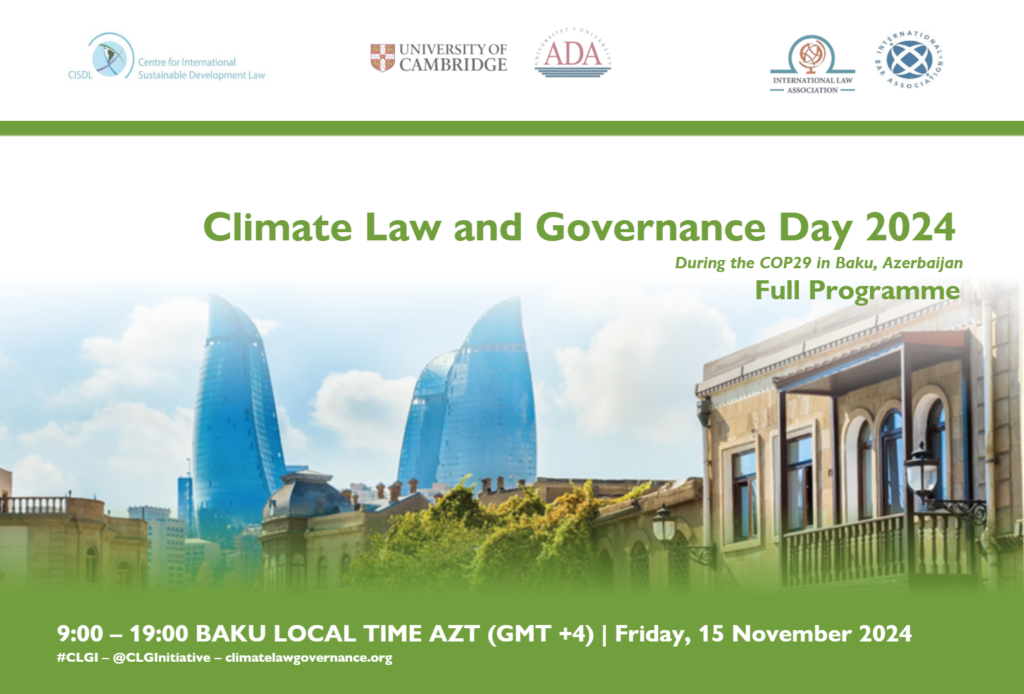
This full-day global symposium will feature distinguished plenaries, celebratory launching events, and more than 8 world-class specialist panels and workshops. To reduce barriers and encourage global participation, this year’s Climate Law and Governance Day will be held entirely online via Zoom.
Overview
CLGD 2024 aims to inspire and optimise legal and institutional reform for achieving current Nationally Determined Contributions (NDCs) under the Paris Agreement, responding to 2024 Global Stocktake outcomes and increasing the ambition of the next round of NDCs. The objectives of the symposium include identifying and sharing innovative international, national, and local law and governance challenges, mechanisms and good practices relating to global efforts to address climate change. By convening esteemed legal and public policy experts, judges, negotiators, professors and practitioners from around the world that are committed to implementing the Paris Agreement, CLGD 2024 seeks to catalyse knowledge exchange and co-generate new climate law and governance scholarship, insights and approaches, facilitating new dialogue and partnerships. The symposium further aims to strengthen capacity and collaboration among the climate law and governance community of practice to implement the Doha Amendment, Paris Agreement and COP outcomes, supporting achievement of the world’s Sustainable Development Goals (SDGs).
CLGD 2024 Themes
This year’s symposium will focus on the following four key themes, which have been identified in consultation with the CLGI Programme Committee based on the vision and goals to enhance ambition and enable action set by Azerbaijan as the UNFCCC COP29 Presidency, as informed by the UNFCCC 60th Subsidiary Bodies meetings in June 2024:
- Operationalising the Paris Agreement: Contributing to the New Collective Quantified Goal on Climate Finance (NCQG), Global Goal on Adaptation, Article 6 Market and Non-market Approaches, Article 9 Loss and Damage Fund, transparency, technology, capacity-building, through the UNFCCC/Paris Agreement implementation architecture (COP/SBs, global dialogues, expert groups, implementation and compliance committee), UNCLOS and other international regimes.
- Scaling Up National Climate Ambition and Action through Law and Governance: Innovating high ambition instruments for climate mitigation, adaptation and resilience, and finance; creating governance synergies within and across sectors; advancing local, regional and national carbon budgets, planning rules and regulations; assessing legal barriers and strengthening capacity amongst leaders, practitioners and advocates for NDCs/LTS delivery.
- Advancing Climate Justice: Engaging civil society and the legal community, courts, law associations and others in raising climate ambition and accelerating climate action, enhancing transparency and ensuring accountability, integrating rights-based approaches, advancing loss and damage response, supporting access to climate justice and climate litigation, and addressing climate migration.
- Deploying the Law and Legal Instruments for Investing in Transition: Harnessing law on all levels and commercial legal instruments to leverage the NCQG for mobilising all finance flows for investment in climate mitigation, adaptation and resilience; scaling up re-allocation of capital and sustainable global supply chains, and addressing fossil fuel subsidies, climate risk disclosure, a just transition and decarbonisation, especially through private, trade, investment and competition law, and through commercial and corporate rules.
More About the Symposium
Climate Law and Governance Day 2024 builds on a series of special events co-hosted by key partners from the Climate Law and Governance Initiative (CLGI) during the UNFCCC climate conferences since the 2005 MOP1/COP11 in Montreal, Canada to mobilise the international law and governance community to help implement the UNFCCC and most recently, the Paris Agreement in the context of the global Sustainable Development Goals. This global international symposium aims to facilitate meaningful dialogue between COP delegates, observers and stakeholders, also keen students, with an interest in national and international law and governance related to climate change, including government representatives and leaders, leading international and domestic legal practitioners, and renowned legal experts.
Warmest thanks are due to the past and present partners and co-hosts of Climate Law and Governance Day.
About the Climate Law and Governance Initiative (CLGI)
The Climate Law and Governance Initiative is a world-leading partnership of law and governance faculties, expert institutes, international organisations, lawmakers, government delegates and foremost practitioners, which since 2015 has been collaborating to foster implementation of the UNFCCC Paris Agreement with the support of a small secretariat provided by the Centre for International Sustainable Development Law (CISDL) from McGill University and the University of Cambridge.
Each year, CLGI supports an international programme of special side events and other sessions hosted by collaborating partners, co-hosts and session hosts, including the Research and Independent NGOs (RINGOs) constituency and others at the COP. These events often take place in official UNFCCC side event zones of the COP29 Climate Change Conference, as well as further associated venues, in collaboration with leading climate law and governance organisations. This year’s events will include a half-day Climate Law and Governance Specialisation Course, which will be held online on 17 November 2024 to strengthen legal and institutional knowledge and capacity of UNFCCC delegates, observers, scholars and others for implementation and compliance with the Paris Agreement. A CLGI Booth at COP may also be available as a meeting point and dedicated space to share knowledge and materials, including about climate law and governance issues and activities, opening opportunities for exchanges among delegates and observers. CLGI publishes blog contributions during COP29, as well as legal working papers and books with world-leading presses based on COP collaborations.
